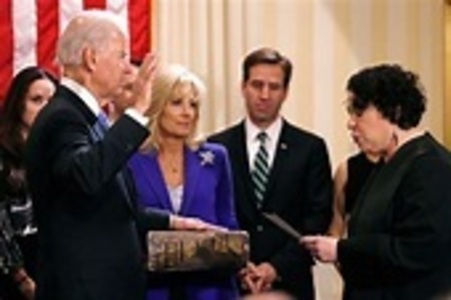500 signatures reached
To: Progressive-minded freethinkers and anyone concerned that organized religion has become far too intrusive into U.S. politics, eroding the Constitutional principle of the separation between church and state.
Secular Oath 2021
This campaign has ended.

-Request President-Elect Joseph R. Biden take his Oath of Office on January 20th, 2021 with his hand on the U.S. Constitution instead of a Bible, as well as using the secular verbiage of “I do so affirm” instead of the sectarian and divisive affirmation of “So help me god.”
-Request all those elected to State and Federal public offices to do the same going forward.
-Request all those elected to State and Federal public offices to do the same going forward.
Why is this important?
-For decades, and particularly during the course of the last four years under the Trump Administration, aggressive and unconstitutional measures have been undertaken to erode the separation between church and state providing excessive privilege and power to religious organizations and individuals, through judicial appointments, Executive Orders, programs such as “Project Blitz,” and the unconstitutional allocation of taxpayer money to fund private religious schools and organizations.
-Religious groups and “faith-based institutions” are seeking to roll back hard-fought advances in areas such as LGBTQ equality and women’s reproductive rights, and as tax-exempt organizations they wield far too much political influence.
-Mr. Biden has emphatically promised to heal the divisions and partisanship by claiming he will be accountable to all Americans, not just those who voted for him. This is generally accepted to mean inclusiveness regardless of gender, race, sexual orientation, political party, and religious affiliation (or lack thereof). Public servants on BOTH sides of the aisle must learn to refrain from using religious language when speaking in their official capacities. This would include references to their god, attempts to "unite" the country by calling for the blessings of a higher power, or reciting scripture from their chosen religious doctrine. When such language is inserted into the public sphere, it serves only to alienate those of differing or no religious affiliation, making them feel like outsiders in their own country.
-As noted in the most recent Pew Research study from 2018, 65% of American adults describe themselves as Christians when asked about their religion, down 12 percentage points over the past decade. These trends indicate a rapid rise of the religiously unaffiliated share of the population, consisting of people who describe their religious identity as atheist, agnostic or “nothing in particular.” This demographic now stands at 26%, up from 17% in 2009.
-Despite the above statistics, those who identify as non-religious or unaffiliated have virtually no cohesive political influence and are virtually ignored in political discourse
-Religious groups and “faith-based institutions” are seeking to roll back hard-fought advances in areas such as LGBTQ equality and women’s reproductive rights, and as tax-exempt organizations they wield far too much political influence.
-Mr. Biden has emphatically promised to heal the divisions and partisanship by claiming he will be accountable to all Americans, not just those who voted for him. This is generally accepted to mean inclusiveness regardless of gender, race, sexual orientation, political party, and religious affiliation (or lack thereof). Public servants on BOTH sides of the aisle must learn to refrain from using religious language when speaking in their official capacities. This would include references to their god, attempts to "unite" the country by calling for the blessings of a higher power, or reciting scripture from their chosen religious doctrine. When such language is inserted into the public sphere, it serves only to alienate those of differing or no religious affiliation, making them feel like outsiders in their own country.
-As noted in the most recent Pew Research study from 2018, 65% of American adults describe themselves as Christians when asked about their religion, down 12 percentage points over the past decade. These trends indicate a rapid rise of the religiously unaffiliated share of the population, consisting of people who describe their religious identity as atheist, agnostic or “nothing in particular.” This demographic now stands at 26%, up from 17% in 2009.
-Despite the above statistics, those who identify as non-religious or unaffiliated have virtually no cohesive political influence and are virtually ignored in political discourse
